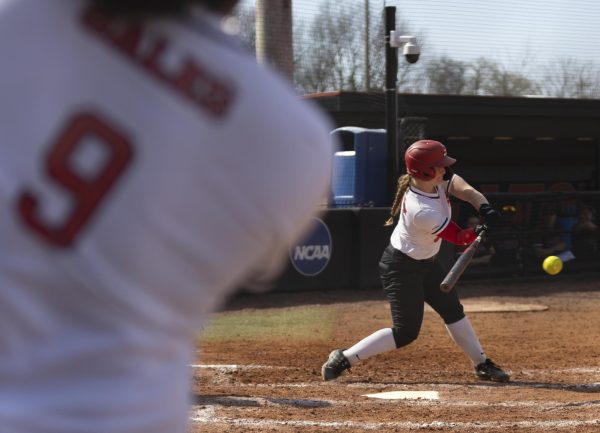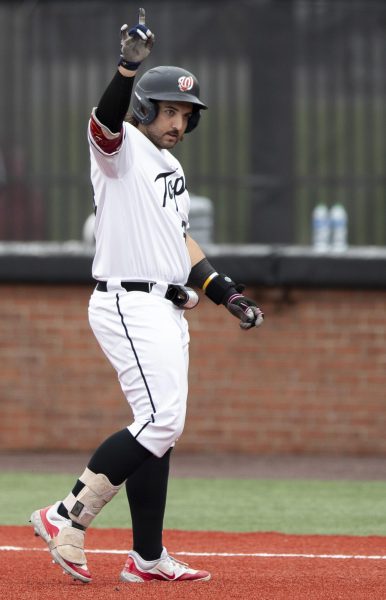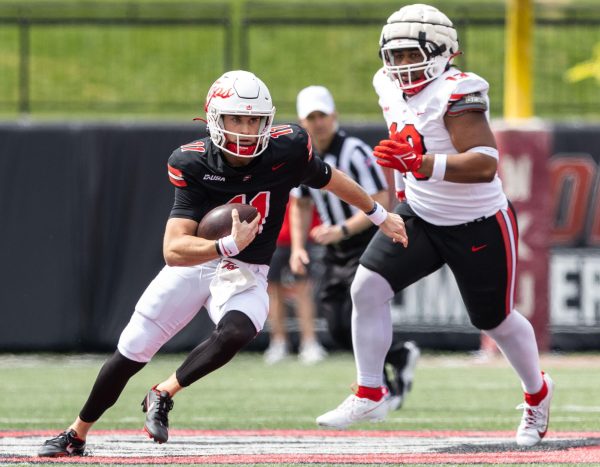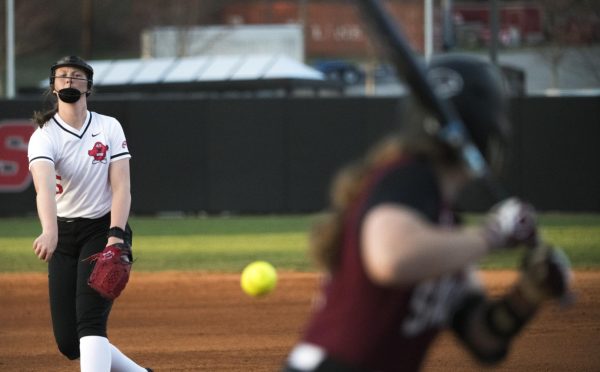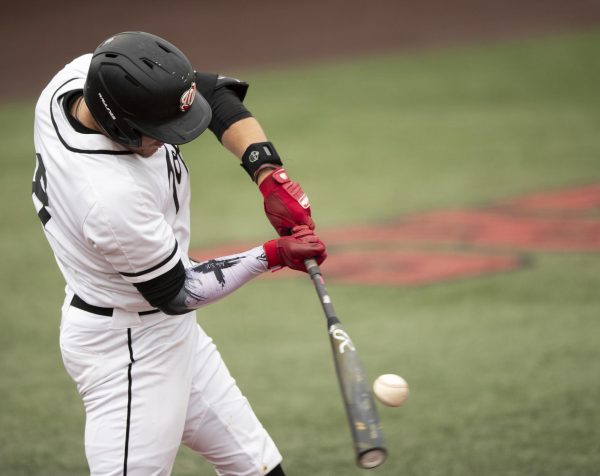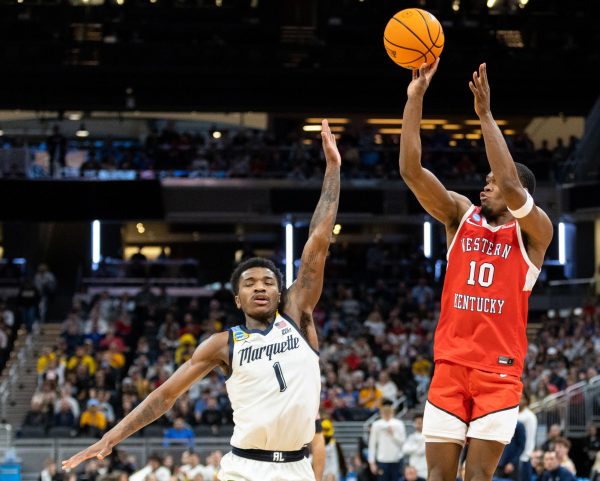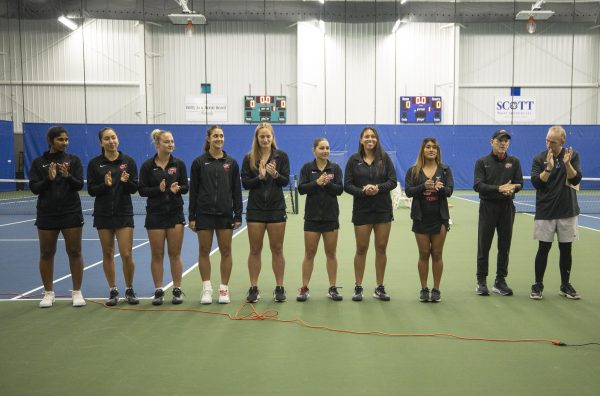TRACK: Against the odds
March 6, 2003
Many people have heard the story before.
Athletes overcome certain obstacles, whether it be poverty or severe illness, and then become an inspiration to people all over the world, all by following the philosophy of never giving up.
Cara Jane Nichols never gave up.
Nichols has been a household name this year in Western cross country and track, having a standout season in both sports.
She received All-Sun Belt honors in cross country. In track, she was selected Sun Belt Performer of the Week in February, and she gave a record-breaking performance in the 800-meter run at the Indiana Invitational.
But it was a long process to get her to where she is now.
Nichols got her athletic start playing baseball, basketball and soccer. But one sport, for some odd reason, stood out: track.
“I just came home from school one day (in the third grade) and told my brother (Chris) that I had to run the mile in class, and I told him my time and that I had won,” Nichols said. “He then told me that I should try out for cross country.”
That’s when her passion for running began.
As a fourth grader in Elizabethtown, Nichols’ running ability was noticed, earning her way to compete on the high school level that same year.
Nichols emerged as a cross country and track performer out of pure love for running, without the help of any sort of special training.
“I basically started to run … because I really liked to run, especially when you’re that young and you’re around all these high schoolers,” she said.
It was her freshman season at Bowling Green High School that led to her stardom as one of the state’s toughest, and best, runners.
She won state in cross country and the two-mile in track. Her early achievements only meant that she was bound to get better.
“I wanted to keep winning state, and I thought that each year I’d get better and win state all four years,” Nichols said. “Getting some state records was basically my goal after my freshman year.”
That goal wasn’t too far-fetched either, because Nichols was running on top of the track world.
Until a thunderbolt of misfortune came into her life.
Tough times
Nichols would go on to win another state title in cross country her sophomore year, but when track season came along in February, she began to experience mysterious symptoms in her body.
One race she’d perform well, but in the next race, she could hardly finish. No one knew what was wrong.
Doctors suspected that she had mononucleosis, a disease that causes fever and swelling of the lymph glands, and tested her.
The first results were negative. But in April, they tested her again and discovered that she did, indeed, have the disease and was just recovering from it.
After the season, she took some time off and trained in the summer to get back into shape. But mono had weakened her immune system so badly that, as a junior, she could barely compete all cross country season.
“I was trying to race, and I wasn’t really getting any better,” Nichols said. “I felt like I was drained all the time.”
This “feeling” resulted in another diagnosis: a deficiency in the red blood cells and a lack of iron, also known as anemia.
Nichols decided to take a season off in track and focus on healing.
But just when Nichols thought her health couldn’t get any worse, it did.
In her senior year, BGHS head coach Ron Skillern wanted to check to see if she was 100 percent ready to compete again, so he took her to an immune disease specialist to get her examined.
Once again, Nichols got bad news: the doctor was 99 percent sure that she had contracted lupus, a skin disease.
Skillern would only run her twice a week, but Nichols was still hopeful, attempting to run races, but to no avail.
“My senior year was really hard for the cross-country season,” Nichols said. “My times were awful, I wasn’t running well, and I had to drop out of a lot of races. It was my last year, so that made it harder, too.”
This harsh blow made Nichols believe that she would never be able to run again.
But she didn’t want to stop fighting. She still had that one percent chance of the doctor being wrong. Through those dark clouds of doubt, a beacon of hope shone.
She changed family doctors and got more tests done. On her 18th birthday, she received the greatest gift imaginable: doctors informed her that she didn’t have lupus after all.
Doctors gave her the OK to run again, and Nichols, gladly taking their advice, began training for the outdoor track season. She placed second in state in the mile run and third in the 800.
Despite her remarkable recovery, college coaches still didn’t want to take the risk of giving Nichols a scholarship.
Except for one coach.
Rebirth of a fighter
Western head coach Curtiss Long overlooked Nichols’ history of illnesses and gave her a scholarship in 2001.
“The thing that impressed me most was her willingness to compete,” he said. “She is combined with superior athletic ability with a ‘down-home’ personality.”
Nichols said her freshman season was primarily a learning experience. She observed distance teammates Olga Cronin and Bonita Paul.
Learning from them has done Nichols well.
Just watching her run, no one would ever guess that she has jumped over so many hurdles to get to the point where she is now.
Nichols takes precautions to avoid having another traumatic experience.
“I still have to be more careful about sicknesses and get more rest than most people do,” she said.
Long isn’t concerned about just her performance, though. He enjoys having her on the team.
“Her spirit and enthusiasm would be worthwhile if she’d be able to run or not,” Long said.
Nichols doesn’t have any regrets, either.
“Had I not gotten sick and gone to a bigger school, I might have ended up getting burnt out with the sport and have a lot of pressure put on me without any family around,” she said. “I would’ve ended up quitting. Western was, by far, the best choice for me.”
And she didn’t need a second opinion for that.
Reach Amber North at [email protected].


















